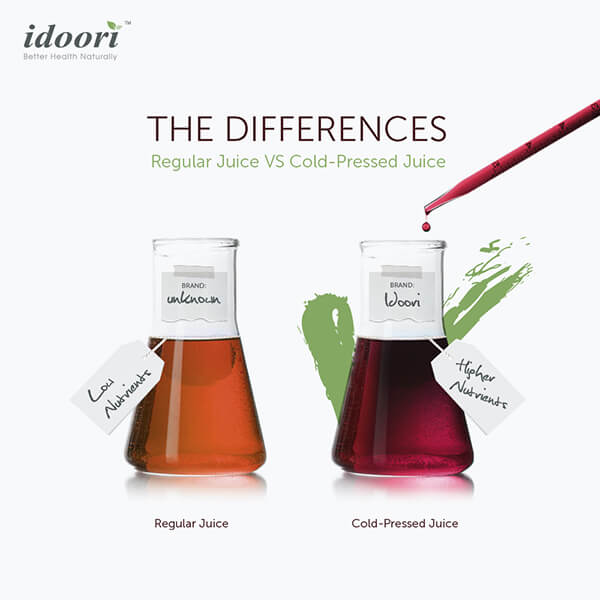What Is Cold Pressed Juice?
Cold pressed, centrifugal and homemade juices – The differences that decide
So you're quite particular about your regular morning juice? But how enlightened are you on the freshness, nutritional value and the potential (as it could always be better!) taste of your daily glass of liquid goodness? And what exactly is cold pressed juice?
If you prefer to squeeze out your own, then you may have some idea about what goes into your glass. However, making your own morning fruity or veggie concoction requires a certain level of dedication. Also a fridge forever stacked with fresh produce and the inclination to peel, de-seed, squeeze, strain and behold! There, you have it! A healthy, somewhat tasty glass of OJ or AJ or whatever else you please.
But mind you, time is of essence before oxidation takes over. Waiting too long to gulp down your glassful can result in some nasty tasting stuff that is, of course, not as healthy as it used to be...
Store bought and cold pressed juices

Currently there are two varieties available in the market. The usual store bought packed juice and the newer cold pressed juice variety. Before we find out what cold pressed juice is, let's address the easier (and cheaper) one first.
Store bought juices
For years, we never bothered to think twice about grabbing our favourite juices off the supermarket shelves. Tempting words such as 'freshly squeezed' or 'straight from the farm' have been enticing us, followed by the 'no added sugar' variety that sealed the deal.
Here's a fact that's so obvious that it can sometimes be taken for granted: Fruit and vegetable juice is highly perishable. All packaged store-bought juice, therefore, goes through a process in which the juice is repeatedly heated till boiling point to ensure bad pathogens are eliminated before it is filled into aseptic layered packaging or bottles. This process prevents the juice from rotting thereby increasing its shelf life, and is known as pasteurisation or centrifugal treatment.
Though pasteurisation is great for storage, sometimes up to six months, and wide spread distribution, there is little that can actually be said about the nutritional value of packaged juice. By the time it actually reaches your morning glass, it has considerably dropped in health and natural goodness. Some say only 10% of the original nutritional content remains...
Now let’s look at the other option that we have...
Cold pressed juices
So, what is cold pressed juice exactly? Like the homemade kind, cold pressed juice also goes through the usual peeling, de-seeding, squeezing and straining. Once all that is done however comes the next part which is much more beneficial than the traditional centrifugal and homemade processes.
Cold pressing involves dropping the temperature of the juice, sealing it in bottles and then placing these in a large chamber of water. Here huge amounts of pressure are applied to the bottled juice. This results in the same desired effects of pasteurisation, that is, the destroying of pathogens.
Cold pressed or high pressure processing involves no heating. This retains the juice's natural taste and fresh, nutritional quality. Though cold pressed juices are more expensive than those treated centrifugally, their benefits over both pasteurised and home made juices are multiple.
iDooRi's Cold pressed juices
Cold pressing is a highly specialised process that requires top class equipment, expertise and infrastructure. iDooRi's manufacturing facility puts in place stringent quality assurance in their cold pressed juice production.
iDoori product range offers delicious and beneficial Cold Pressed Natural Korean Black Raspberry and Aronia Extract.
With Father's Day just around the corner, there can be no better gift idea than an iDoori cold pressed juice to ensure the good health and longevity of the man of the house! Conveniently order the juice of your choice online today.
Happy Father's Day gifting!








